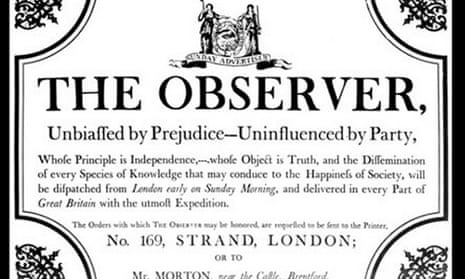Today, we are proud and excited to launch our new design for the Observer. We think it’s vital for a newspaper to shed its skin from time to time, to reimagine itself for loyal readers and to welcome a new generation to our journalism. The aim of the new look is to make the paper a little sharper and a little friendlier, while not compromising the scope and depth of its engagement with politics or the arts, foreign news or sport, innovation and ideas and all the light and shade of life.
Quick GuideThe Observer
Show
The Observer is the world's oldest Sunday newspaper, founded in 1791. It is published by Guardian News & Media and is editorially independent.
We may have changed the way the Observer looks, but the principles by which the paper aims to see and understand the world have not altered in the 226 years since it first came off the presses from its offices at 169 The Strand. Those ambitions were set out in the paper’s launch manifesto in December 1791. At this moment of change it is worth restating them not as a slice of 18th-century history, but as an ongoing 21st-century commitment: “Unbiased by Prejudice. Uninfluenced by Party. Whose principle is Independence. Whose object is Truth and the dissemination of every Species of Knowledge that may conduce to the Happiness of Society…”
Every age believes it faces unique challenges and crises and triumphs. The world’s oldest Sunday newspaper was born into a time of radical political and cultural upheaval, particularly in Europe and the United States. In its first year, the Observer reported the imprisonment of Louis XVI in France and the beginnings of the Reign of Terror and the revolutionary wars; it covered the start of George Washington’s second term at the head of the newly independent American democracy. Informed, accessible, campaigning journalism was born out of a necessity to make reliable, nuanced sense of a complex world.
That necessity does not change with new formats and new platforms and rarely has it felt more urgent. As we recreate the paper for 2018, we continue to report on the implications of Britain’s chaotic exit from the European Union – Emmanuel Macron’s visit last week sadly underscored the unfolding reality of our willed disconnection with our closest friends and allies. Meanwhile, across the Atlantic, the threats to civilised democracy and hard-won freedoms posed by the 45th incumbent in George Washington’s office are heightened week by week.
Politicians have long sought to discredit progressive comment and legitimate inquiry. In this country, a polarised politics has led to unprecedented official attacks on expert opinion and established fact. In America, President Trump’s “Fake News Awards” may have been a laughable distraction from the Mueller investigation but they were, too, a further signal that repressive forces are ascendant.
In such a climate – and with an internet growth industry in deliberate untruth and unsourced conspiracy – reliable voices can be hard to find. The Observer can point to a tradition of putting itself not only at the heart, but also on the liberal, human, side of the issues of the moment.
It was the paper that first campaigned and won the right for the press to report from court rooms. It vocally supported the abolitionists’ cause in the American Civil War. It gave George Orwell time and space to make the case for independence in British colonies. It was crucial in the anti-apartheid movement in South Africa (Nelson Mandela credited the Observer’s coverage of his trial in 1964 with helping save him from the death penalty). It boasted the first woman newspaper editor and the first environment correspondent…
That Observer tradition – a voice that seeks to be compassionate and unflinching, self-critical and mischievous – does not mean anything unless we add to it Sunday by Sunday. We believe the inviting new shape and feel to our paper will help that voice to continue to be heard loud and clear; we trust that you do too.
